| Srl | Item |
| 1 |
ID:
152606
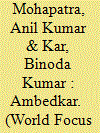

|
|
|
|
|
| Summary/Abstract |
The very essence of Ambedkar’s vision of social justice was to establish a just, equitable and fair society, where the women, scheduled castes and scheduled tribes would get their due place in the society and for that he did incorporate the provisions in the Indian Constitution so that they would get adequate opportunities so that they could be freed from the then prevalent social evils and ill-practices in the society. As an ardent champion of the cause, he sacrificed his whole life for the amelioration of the conditions of such people in the Indian society. Therefore, he is even hailed today as the messiah of the oppressed and downtrodden.
|
|
|
|
|
|
|
|
|
|
|
|
|
|
|
|
| 2 |
ID:
119977
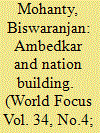

|
|
|
| 3 |
ID:
119976
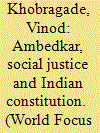

|
|
|
| 4 |
ID:
119980
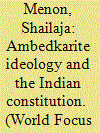

|
|
|
| 5 |
ID:
102112
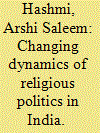

|
|
|
| 6 |
ID:
175889
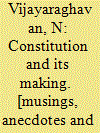

|
|
|
|
|
| Publication |
Haryana, OakBridge Publishing Pvt Ltd, 2021.
|
| Description |
xiv, 222p.Pbk
|
| Standard Number |
9789389176704
|
|
|
|
|
|
|
|
|
|
|
|
Copies: C:1/I:0,R:0,Q:0
Circulation
| Accession# | Call# | Current Location | Status | Policy | Location |
| 059920 | 342.54029/VIJ 059920 | Main | On Shelf | General | |
|
|
|
|
| 7 |
ID:
162467
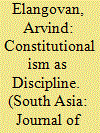

|
|
|
|
|
| Summary/Abstract |
Ironically, despite being acclaimed as one of the foremost biographers of the Indian Constitution, little is known about Benegal Shiva Rao (1891–1975) or his ideas about constitutionalism. By delving into Rao's published writings and his incomplete, unpublished autobiography, this essay reconstructs his idea of constitutionalism as one that primarily sought to discipline politics. However, I argue that such a view also leads to erasing the accounts of political conflict that comprise the history of the Indian Constitution. By analytically bringing together this curious triadic relationship between politics, constitutionalism and history, this essay explores how an isolated focus on constitutionalism leads to troubling historical amnesia.
|
|
|
|
|
|
|
|
|
|
|
|
|
|
|
|
| 8 |
ID:
118482
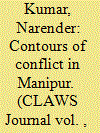

|
|
|
| 9 |
ID:
157085
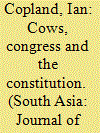

|
|
|
|
|
| Summary/Abstract |
Added late to the draft Indian Constitution, Article 48 specifically mandated the Indian state to criminalise the killing of cows, a provision that, as well as being arguably at odds with at least three of the document's Directive Principles, was implicitly anti-Muslim. The provision was adopted, almost without demur, by a Constituent Assembly dominated by the Congress at a time when discrimination against the Indian Muslim minority in other fields was rife. With hindsight, the making of Article 48 can be seen as the first victory in post-colonial India of the nascent Hindu Right, preceding as it did even the formation of the country's first effective Hindu political party, the Bharatiya Jana Sangh. This paper investigates how, and why, the cause of cow protection came to be supported (and effectively sponsored) in the Assembly by senior members of a supposedly secular Congress parliamentary caucus headed by staunch anti-communalist, agnostic and Muslim sympathiser, Prime Minister Jawaharlal Nehru.
|
|
|
|
|
|
|
|
|
|
|
|
|
|
|
|
| 10 |
ID:
170227
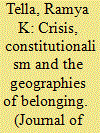

|
|
|
|
|
| Summary/Abstract |
The Anthropocene – as a geological and cultural epoch – brings with it new modes of articulating environmental crisis and citizenship for peoples in India. This essay illustrates how space, scale and identity can be located within contemporary climate political imaginations through the normative canvas of the Indian Constitution. It argues that by thinking about climate change as a collection of dualisms – past/present, near/faraway, futures/futurelessness – Indian vocabularies of constitutionalism can inform authoritative understandings of crisis and citizenship. The article makes use of empirical material collected between 2016–17 for the author's doctoral research. It argues that Indian climate change elites characterize crisis in distinctive ways that draw attention to the symbolic and material implications of interrogating the shifting geographies of belonging in India. It shows how they make use of a framework of constitutionalism that is simultaneously attentive to the semantics of both planetary and subaltern thinking in the Anthropocene.
|
|
|
|
|
|
|
|
|
|
|
|
|
|
|
|
| 11 |
ID:
173819
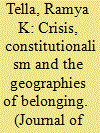

|
|
|
|
|
| Summary/Abstract |
The Anthropocene – as a geological and cultural epoch – brings with it new modes of articulating environmental crisis and citizenship for peoples in India. This essay illustrates how space, scale and identity can be located within contemporary climate political imaginations through the normative canvas of the Indian Constitution. It argues that by thinking about climate change as a collection of dualisms – past/present, near/faraway, futures/futurelessness – Indian vocabularies of constitutionalism can inform authoritative understandings of crisis and citizenship. The article makes use of empirical material collected between 2016–17 for the author's doctoral research. It argues that Indian climate change elites characterize crisis in distinctive ways that draw attention to the symbolic and material implications of interrogating the shifting geographies of belonging in India. It shows how they make use of a framework of constitutionalism that is simultaneously attentive to the semantics of both planetary and subaltern thinking in the Anthropocene.
|
|
|
|
|
|
|
|
|
|
|
|
|
|
|
|
| 12 |
ID:
162469
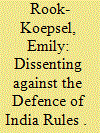

|
|
|
|
|
| Summary/Abstract |
Indian democracy has been plagued by a long history of ‘rules’ and ‘acts’, defined broadly as assigning to the state the power to impose order, but without clear guidelines as to their use. Understanding agitations against these rules and acts is helpful in seeing a line of challenge to state authority from the position of democracy. This paper will describe the agitations by the All India Newspaper Editors’ Conference (AINEC) against Article 41 of the Defence of India Rules (1939), which focused on the government's ability to censor, ban and fine newspapers. AINEC's fight made visible the effect of capricious and unpredictable government actions on actors outside the elite. In addition, the shifts in censorship brought about by the Defence of India Rules highlighted how groups, ideas or writing could shift from being regarded as ‘responsible’ and credible to ‘irresponsible’ and dangerous on the basis of state decisions.
|
|
|
|
|
|
|
|
|
|
|
|
|
|
|
|
| 13 |
ID:
119982
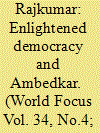

|
|
|
| 14 |
ID:
117908
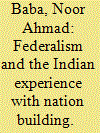

|
|
|
|
|
| Publication |
2011.
|
| Summary/Abstract |
For plural societies like India, the only workable strategy of nation building is to provide all segments of society with an equal sense of belonging, respect and security. The Indian constitutional framework, despite some assimilationist influences, was broadly drawn on accommodationist lines. As a matter of policy, India adopted cultural pluralism rather than an assimilationist brand of cultural nationalism. The Constitution allowed federalism to develop and evolve as a dynamic process, despite certain inbuilt limitations that undermined its functioning in its initial three decades. Nevertheless, there has never been a consensus in India about using special provisions/autonomy as a strategy of nation building or as a mechanism of problem solving. Such an arrangement in the context of Kashmir was seen as an aberration and a potential source of disunity for the country. However, the erosion of Article 370 has undermined rather than promoted the cause of national integration in relation to Kashmir.
|
|
|
|
|
|
|
|
|
|
|
|
|
|
|
|
| 15 |
ID:
187286
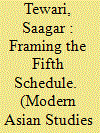

|
|
|
|
|
| Summary/Abstract |
As a means to resolve the Tribal Question in India, the centrality of the Fifth and Sixth Schedules of the Indian Constitution is widely acknowledged. However, their final incorporation, despite intense nationalist opposition in the run-up to Indian Independence, remains historically unexplained. This article addresses this lacuna by reconstructing the circumstances under which the Indian National Congress came to accept scheduling as a viable method of providing protection to tribal communities. This strategic shift can be explained as a result of combined political pressures generated by communist-led tribal movements and a steadily mounting challenge heralded by a new stream of educated middle-class tribal activists in eastern India. Foremost among the latter was Jaipal Singh Munda who mobilized a large constituency of supporters demanding a separate province of Jharkhand. Taken together, there is enough evidence to prove that in the period 1937–1950, the tribes were not silent and their collective agency had a deep impact on the constitution-making process. Finally, the article argues that this period witnessed a significant change in the character of the Congress as erstwhile freedom-fighters turned into ruling elites.
|
|
|
|
|
|
|
|
|
|
|
|
|
|
|
|
| 16 |
ID:
085374
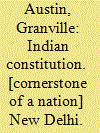

|
|
|
|
|
| Publication |
New Delhi, Oxford University Press, 2008.
|
| Description |
xxii, 390p.
|
| Standard Number |
9780195649598
|
|
|
|
|
|
|
|
|
|
|
|
Copies: C:1/I:0,R:0,Q:0
Circulation
| Accession# | Call# | Current Location | Status | Policy | Location |
| 053992 | 342.54/AUS 053992 | Main | On Shelf | General | |
|
|
|
|
| 17 |
ID:
119964
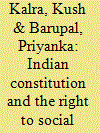

|
|
|
| 18 |
ID:
120949
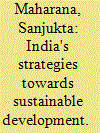

|
|
|
| 19 |
ID:
158821
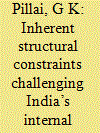

|
|
|
|
|
| Summary/Abstract |
The words ‘internal security’ do not figure in the Constitution of India. At the time of the framing of the Indian Constitution, the lawmakers were more worried about preserving the unity and sovereignty of the new nation. The world was in a far more peaceful environment and issues like terrorism and cybersecurity were far from their minds. Their outlook was conditioned by the constitutions then in existence. The thought was that all law and order situations could be handled by the state governments and the role or duty of the Union government (Article 355) was to protect the states from external aggression and internal disturbances and to ensure that governance is carried on in accordance with the provisions of the Constitution.
|
|
|
|
|
|
|
|
|
|
|
|
|
|
|
|
| 20 |
ID:
144346
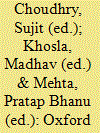

|
|
|
|
|
| Publication |
New Delhi, Oxford University Press, 2016.
|
| Description |
lxv, 1048p.pbk
|
| Standard Number |
9780198787334
|
|
|
|
|
|
|
|
|
|
|
|
Copies: C:1/I:0,R:1,Q:0
Circulation
| Accession# | Call# | Current Location | Status | Policy | Location |
| 058626 | 342.54/CHO 058626 | Main | On Shelf | Reference books | |
|
|
|
|